|
|
|
Sort Order |
|
|
|
Items / Page
|
|
|
|
|
|
|
| Srl | Item |
| 1 |
ID:
193455
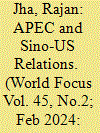

|
|
|
|
|
| Summary/Abstract |
The paper tries to examine the changing contour of Sino-US relations in the context of churning in the geostrategic landscape at the time when the US is simultaneously engaged in conflict in two theaters i.e. Ukraine and West Asia. The San Francisco meeting held in November 2023 reflects a desire on the part of the US to manage its great power competition with China. On the Chinese side, the debilitating impact of tariff war with the US, its denial of advanced technology to its companies provides an ideal setting for China to seek a modus vivendi with the US. Hence this meeting has profound ramification at global and regional levels including in India.
|
|
|
|
|
|
|
|
|
|
|
|
|
|
|
|
| 2 |
ID:
130174


|
|
|
|
|
| Publication |
2014.
|
| Summary/Abstract |
In responding to China's rise, the best strategy for Australia involves a combination of accommodation and ''soft balancing.'' The viability of this strategy is related to the extent to which U.S.-China relations are cooperative or conflictual. Recent Australian governments have been successful in implementing this preferred strategy.
|
|
|
|
|
|
|
|
|
|
|
|
|
|
|
|
| 3 |
ID:
127354
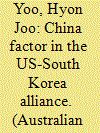

|
|
|
|
|
| Publication |
2014.
|
| Summary/Abstract |
Over the past 10 years, South Korea has chosen inconsistent strategies with respect to the US-South Korea alliance. On the one hand, Seoul disagreed with Washington about the extended role of United States Forces Korea and the deployment of US missile defence systems in East Asia. On the other hand, these problems ironically coincided with South Korea's strong support for the USA in operations in Afghanistan and Iraq. What explains the inconsistency of South Korea's alliance policies? Major schools of thought in international relations have offered explanations, but their analyses are deficient and indeterminate. This article looks at the South Korea-China-North Korea triangle as a new approach to explaining the puzzling behaviour of South Korea. The model shows that South Korea's alliance policies are driven by two causal variables. First, North Korea is an impelling force for South Korea to remain as a strong US alliance partner. This encourages Seoul to maintain cooperation with Washington in wide-ranging alliance tasks. Second, South Korea's policies are likely to reflect the way the nation perceives how useful China is in taming North Korea. The perceived usefulness of China causes Seoul to accommodate China and decrease cooperation with the USA. This might strain the relationship with the USA should South Korea evade alliance missions that might run contrary to China's security interests.
|
|
|
|
|
|
|
|
|
|
|
|
|
|
|
|
| 4 |
ID:
128749
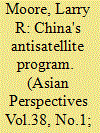

|
|
|
|
|
| Publication |
2014.
|
| Summary/Abstract |
I analyze the substance and goals of China's antisatellite program. Following China's 2007 antisatellite test that successfully destroyed one of its aging satellites, signs have emerged that China is continuing to research ways to exploit the heavy US reliance on space. This capability is most likely being developed as an "assassin's mace" to gain an advantage against a technologically superior enemy in the event of conflict. I propose a number of countermeasures to negate the threat to US space security
|
|
|
|
|
|
|
|
|
|
|
|
|
|
|
|
| 5 |
ID:
129689
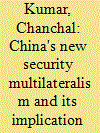

|
|
|
|
|
| Publication |
2014.
|
| Summary/Abstract |
In the existing literature of Chinese foreign policy, China is often portrayed as a reluctant and suspicious participant in multilateral diplomacy, particularly in the domain of security multilateralism. As a staunch advocate of the Westphalia international system of nation-state and national sovereignty, China is more comfortable dealing with other nations bilaterally rather than multilaterally. By examining these new practices of multilateralism and related conceptual evolution in China's foreign policy in recent years, shifting from passive response to achieve participation and even initiation, multilateral diplomacy has increasingly become an integral part of Chinese foreign policy in general and regional diplomacy in particular. China no longer perceives security multilateralism as a taboo; rather, it has gradually recognized the legitimacy of the multilateral approach in resolving international and regional security issues, and it has actively explored new forms of multilateralism in security relations with other countries.
|
|
|
|
|
|
|
|
|
|
|
|
|
|
|
|
| 6 |
ID:
184033
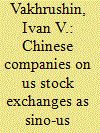

|
|
|
|
|
| Summary/Abstract |
This paper analyzes the relationships between the Chinese and US stock markets, concluding that there is an indirect psychological link between the two. It looks at issues related to Chinese companies' future prospects on US stock exchanges and the risks of getting delisted as Chinese-American relations become seriously aggravated and the US Securities and Exchange Commission (SEC) acts vigorously to toughen requirements for auditing, financial accounting, and information disclosure by foreign companies registered on US exchanges. The author describes the process of forming a new regulatory framework for delisting Chinese companies whose basic element was the passing of the Holding Financial Companies Accountable Act (HFCAA). The paper analyzes the IPO scheme of variable interest entities (VIE) that Chinese companies use abroad, and also identifies the risks involved. The author also analyzes the competitive potential of national stock exchanges in terms of attracting Chinese IPOs, and draws conclusions about much stricter requirements and lengthier procedures on Chinese exchanges in comparison with American ones.
|
|
|
|
|
|
|
|
|
|
|
|
|
|
|
|
| 7 |
ID:
146234
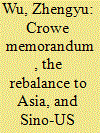

|
|
|
|
|
| Summary/Abstract |
Many contemporary academics and policy analysts have revisited the Anglo-German rivalry before 1914 to predict what may await China and the United States in the twenty-first century. However, few, if indeed any, have specified in what sense this comparison can be made. This paper attempts to fill this gap with a detailed analysis of the strategic parallels between the Anglo-German rivalry then and the China–US competition now through the lens of the Crowe Memorandum. The author argues that the basic parallel between the rise of Germany and the rise of China lies in the challenges they posed or pose to the dominant maritime power and system leader – Great Britain then and the United States today. This parallel also explains the similarity between the Triple Entente initiated by Great Britain prior to 1914 and the Rebalance to Asia launched by the United States in 2011. Furthermore, as in the case of the Anglo-German rivalry before 1914, the most crucial problem underlying the mounting China–US competition in recent years has been America’s deepening apprehension about the development of China’s anti-access/area-denial (A2/AD) and naval capabilities. This development, from the US perspective, is threatening to deprive the US of its most crucial instrument to influence the strategic equilibrium on the East Asian littorals. Based on the lessons of the Anglo-German rivalry prior to 1914, the essay also examines the potential for mitigating, if not eliminating, the mounting competition and misgivings between China and the United States.
|
|
|
|
|
|
|
|
|
|
|
|
|
|
|
|
| 8 |
ID:
129570
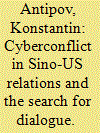

|
|
|
|
|
| Publication |
2014.
|
| Summary/Abstract |
The unprecedented escalation of conflict between China and the United States in cyberspace signals a definite crisis in Chinese-American relations. At the same time, the results from informal meetings between, Xi Jinping and Barak Obama in California on June8-9, 2013 show that the United States and China could possible move toward a new stage in their relations in the field of security.
|
|
|
|
|
|
|
|
|
|
|
|
|
|
|
|
| 9 |
ID:
147301


|
|
|
|
|
| Summary/Abstract |
The ‘Freedom of Navigation’ issue has been volatile and often influenced by Sino-US relations in recent years. This problem was rooted in different interpretation of the UNCLOS by China and the US. It has also reflected their different national Interests and maritime strategies. This issue has caused frequent frictions between the two sides and may lead to their future contest for sea power. At the same time, it also urges the both sides to set up new mechanism for confidence building that may help them to manage it in a more rational way.
|
|
|
|
|
|
|
|
|
|
|
|
|
|
|
|
| 10 |
ID:
188258
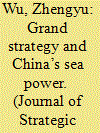

|
|
|
|
|
| Summary/Abstract |
This paper is an academic review of Red Star over the Pacific: China’s Rise and the Challenge to US Maritime Strategy (2nd Edition). It starts with a critical review of the book’s analytical framework for interpreting the development of China’s sea power in the previous decades. Then it scrutinizes respectively the book’s discussions of the logic and grammar of China’s sea power, and reveals simultaneously the contradictions embedded in China’s maritime policy and practice today. The paper ends up with an evaluation of the prospects of China’s sea power and its implications in view of the contradictions revealed.
|
|
|
|
|
|
|
|
|
|
|
|
|
|
|
|
| 11 |
ID:
164089
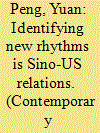

|
|
|
| 12 |
ID:
147373
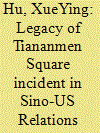

|
|
|
|
|
| Summary/Abstract |
The Tiananmen Square Incident of 1989 was one of the most influential events in the last few decades on China’s relationship with the world. In the aftermath, a united front was formed by the international community against China led by the USA. Tiananmen had negatively impacted the views of the American public and Congress on China, and it has not recovered since. At the turn of the century, the international context of US-China relations and China’s domestic, economic, and political conditions had changed drastically since 1989. This study sets out to understand what is the legacy of Tiananmen Square Incident of 1989 in Sino-US relations post-2000. Taking into accounts of the American media, relevant Congressional Committees, Congress legislations, and Department of State from 2000 to 2015, extensive research has been conducted on several aspects of American foreign policy to understand the lasting impacts of Tiananmen. At the start of the year 2000, references to Tiananmen seek to use its strength, as a symbol to associate with contemporary events remained strong in the media and was relatively weak in the discourse of US policy, but the Tiananmen arms embargo debate revived its value in the collective foreign conscience. With China’s increasing prominence on the international stage, American policy toward China is changing particularly with Obama administrations’ introduction of the pivot to East Asia. Invoking negative views of China created by the Tiananmen Square incident could gain greater influence in Sino-US relationship when its symbolic value can enforce traditional power interests.
|
|
|
|
|
|
|
|
|
|
|
|
|
|
|
|
| 13 |
ID:
152152
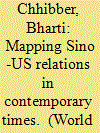

|
|
|
|
|
| Summary/Abstract |
Sino-American perceptions of global order vary drastically and they do not share many security interests or political values. Present distrust between the U.S. and China is based on conflicting strategic, economic, and ideological perspectives. America’s denouncement of one-China policy under President Trump seems to be a strategy to manage increasingly assertive China. It is widely believed in America that with the rise in China’s economic and military power it is becoming more expansionary and intend to be a threat to freedom of navigation in the South China and East China seas, as well as a threat to the security of the U.S. allies in the region—primarily Japan, South Korea and Australia.
|
|
|
|
|
|
|
|
|
|
|
|
|
|
|
|
| 14 |
ID:
130175
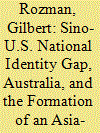

|
|
|
|
|
| Publication |
2014.
|
| Summary/Abstract |
Australia is a middle power caught between rising dependence on China, which seeks a sinocentric region, and growing security reliance on the U.S., which strives for a trans-Pacific community supporting universal values. In light of the Sino-U.S. identity gap and different concepts of regionalism, its response becomes clearer.
|
|
|
|
|
|
|
|
|
|
|
|
|
|
|
|
| 15 |
ID:
152144
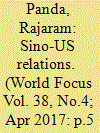

|
|
|
|
|
| Summary/Abstract |
Within almost two weeks of assuming office on 20 January 2017, President Donald Trump demonstrated excessive belligerence by signing a series of executive orders that now threaten to unbalance the existing world order, whose implications seem perilous for the world. His executive orders seem now to be the antithesis of his campaign promise of “creating stability” in the world by converting the world more unstable. From the stances on China, Mexico, Australia, immigration law, banning entry of people from six Muslim majority countries and threatening some other countries, Trump has insulted, provoked and picked fights with many in the first two weeks in office. As analysts world-over remain busy examining the policy consequences of the Trump Presidency, they equally worry identifying the sector which Trump would finally choose to launch his first serious international conflict. A conflict-situation is ripe in many fronts and to trigger one could be of Trump’s choosing.
|
|
|
|
|
|
|
|
|
|
|
|
|
|
|
|
| 16 |
ID:
088462
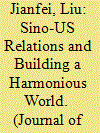

|
|
|
|
|
| Publication |
2009.
|
| Summary/Abstract |
A harmonious world will benefit the whole world including China and the United States. Building a harmonious world calls for good relations between all countries, especially favorable Sino-US relations. Even though China and the US have different perceptions with respect to building a harmonious world, the two countries need to cooperate for that to happen. The constructive partnership between China and the US provides a solid foundation for cooperation between them. For further cooperation, both should work towards building strategic mutual trust and increasing mutual understanding.
|
|
|
|
|
|
|
|
|
|
|
|
|
|
|
|
| 17 |
ID:
165879
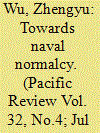

|
|
|
|
|
| Summary/Abstract |
On May 26th, 2015, China published its 10th Defense White Paper which integrated 'open seas protection', along with 'offshore waters defense', into its naval strategy. This shift in naval strategy, albeit largely anticipated, raises a series of important questions about China's maritime ambitions. This article seeks to analyze the causes, nature and challenges of China's latest shift in naval strategy, and its implications for Sino-US maritime relations. The article argues that China's latest shift in naval strategy is a logical corollary of the tension between China's expanding global interests and its asymmetric approach to sea power, and the Belt and Road Initiative (BRI) provides the necessary stimulus and justification for such a shift. China's new naval strategy, the paper contends, denotes that it will develop a Mahanian blue-water navy and a basic network of overseas bases in the years ahead. Those two developments are expected to pose a series of significant challenges for China's foreign policy. The article argues that China's new naval strategy presents both challenges and opportunities for China and the world. To accomplish 'open seas protection', China will probably have to modify its policies on a range of issues, and moderate its competitive stance in the near seas. Although China's new naval strategy need not be interpreted in a competitive framework, it does present China with a stark choice: either it pursues more friendly attitudes towards its maritime ambitions by modifying its current policy, or it will be increasingly confronted by a coalition of hostile states.
|
|
|
|
|
|
|
|
|
|
|
|
|
|
|
|
| 18 |
ID:
177315


|
|
|
|
|
| Summary/Abstract |
No other text in the intellectual history of International Relations has become as frequent a victim of confirmation bias and selective presentism as has Thucydides’ History of the Peloponnesian War. Most recently, misinterpretations of the classical treatise have engendered the popular catchphrase, “the Thucydides’ Trap”, and thinkers and politicians’ resultant drawing of erroneous parallels between the Peloponnesian War and current Sino-US relations. This article seeks to deconstruct the Thucydides’ Trap core thematic of inadvertent escalation, and to outline the logic of hegemonic transition as it is actually expounded by Thucydides. Although Thucydides is the first thinker in the West clearly to identify the significance of structure in interstate affairs, his hegemonic transition theory is complex rather than purely systemic. Thucydides thus dedicates most of his work to assessing the strategic decisions made in fervid political debates, evidencing his perception of polity and politics as key elements that dynamically interact with structural conditions to effectuate strategic choice. Consequently, the Peloponnesian War was not an outcome of inadvertent escalation, but of premeditated strategic choices made by adversaries with clashing policy objectives. Therefore, within the structural constraints, it is on leadership and strategy that Thucydides puts a premium, and hence prioritizes prudence (Sophrosyne/Σωφροσύνη) as the most consequential virtue of statesmanship. Building on the Thucydidean logic of hegemonic transition, we conclude by presenting six strategic corollaries of contemporary Sino-US relations, remaining attentively cognizant at all times of the limitations of historical analogies, and abiding by ex antiquis et novissimis optima.
|
|
|
|
|
|
|
|
|
|
|
|
|
|
|
|
|
|
|
|
|